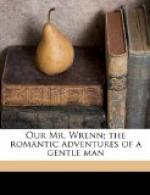A third-class steward with a mangy mustache and setter-like tan eyes came teetering down-stairs, each step like a nervous pencil tap on a table, and peered over the side of Mr. Wrenn’s berth. He loved Mr. Wrenn, who was proven a scholar by the reading of real bound books—an English history and a second-hand copy of Haunts of Historic English Writers, purchased in Liverpool—and who was willing to listen to the steward’s serial story of how his woman, Mrs. Wargle, faithlessly consorted with Foddle, the cat’s-meat man, when the steward was away, and, when he was home, cooked for him lights and liver that unquestionably were purchased from the same cat’s-meat man. He now leered with a fond and watery gaze upon Mr. Wrenn’s scholarly pursuits, and announced in a whisper:
“They’ve sighted land.”
“Land?”
“Oh aye.”
Mr. Wrenn sat up so vigorously that he bumped his head. He chucked his papers beneath the pillow with his right hand, while the left was feeling for the side of the berth. “Land!” he bellowed to drowsing cabin-mates as he vaulted out.
The steerage promenade-deck, iron-sided, black-floored, ending in the iron approaches to the galley at one end and the iron superstructures about a hatch at the other, was like a grim swart oilily clean machine-shop aisle, so inclosed, so over-roofed, that the side toward the sea seemed merely a long factory window. But he loved it and, except when he had guiltily remembered the books he had to read, he had stayed on deck, worshiping the naive bright attire of immigrants and the dark roll and glory of the sea.
Now, out there was a blue shading, made by a magic pencil; land, his land, where he was going to become the beloved comrade of all the friends whose likenesses he saw in the white-caps flashing before him.
Humming, he paraded down to the buffet, where small beer and smaller tobacco were sold, to buy another pound of striped candy for the offspring of the Russian Jews.
The children knew he was coming. “Fat rascals,” he chuckled, touching their dark cheeks, pretending to be frightened as they pounded soft fists against the iron side of the ship or rolled unregarded in the scuppers. Their shawled mothers knew him, too, and as he shyly handed about the candy the chattering stately line of Jewish elders nodded their beards like the forest primeval in a breeze, saying words of blessing in a strange tongue.
He smiled back and made gestures, and shouted “Land! Land!” with several variations in key, to make it sound foreign.
But he withdrew for the sacred moment of seeing the Land of Promise he was newly discovering—the Long Island shore; the grass-clad redouts at Fort Wadsworth; the vast pile of New York sky-scrapers, standing in a mist like an enormous burned forest.




